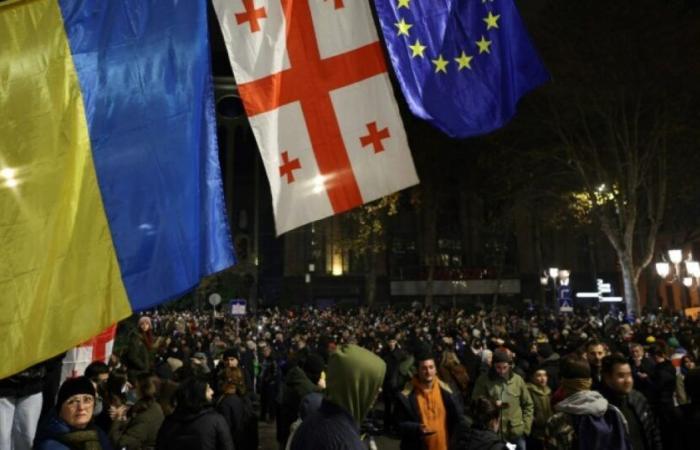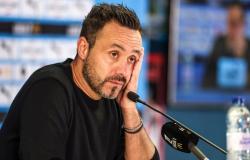Tens of thousands of pro-EU demonstrators gathered again on Sunday evening in several towns in Georgia, for the fourth night in a row, to protest against the government, which has ruled out the organization of new legislative elections as demanded by the opposition.
This former Soviet republic has been in turmoil since the legislative elections of October 26, won by the ruling Georgian Dream party but denounced as tainted by irregularities by the opposition, which is boycotting the new Parliament.
A new election is being demanded by the opposition parties as well as by President Salomé Zourabichvili, who announced that she would refuse to give up her mandate at the end of the year as long as new legislative elections do not take place.
“Of course not,” replied Prime Minister Irakli Kobakhidze to journalists who asked him if the government, accused of pro-Russian authoritarian drift, would agree to organize new elections.
The demonstrations in recent days were triggered by the government's decision to postpone the country's ambitions to join the European Union until 2028.
These gatherings in Tbilisi and other cities were repressed with water cannons and tear gas by the police, who made more than 150 arrests. Dozens of police officers were injured by projectiles and firecrackers thrown by demonstrators.
For the fourth consecutive night, tens of thousands of pro-European demonstrators gathered again on Sunday in front of Parliament, waving European and Georgian flags, AFP noted.
For Alexandre Diasamidze, a 32-year-old bartender, “the Georgian Dream is not the Georgian government. It is a pro-Russian government and they must leave.”
At the start of the evening, groups of police, protected by shields, activated water cannons to disperse the crowd, without much success: demonstrators took hands and danced in circles, and a small group stood motionless under a deluge of water, holding a large Georgian flag.
Others sent fireworks in the direction of the police officers, impassive behind their protective shields.
But at the end of the evening, the riot police intervened in force, using tear gas and water cannons to disperse the demonstrators, some of whom, shouting “Fuck Russia!”, erected barricades with trash cans that they were set on fire.
Levan Khabeishvili, head of the main opposition party, the United National Movement, told journalists that he had been attacked by around fifteen masked police officers, who tried to arrest him before he managed to flee thanks to other demonstrators.
Protests took place in other cities in Georgia.
– “Unacceptable” for the EU –
The new head of European diplomacy, Kaja Kallas, criticized earlier Sunday a disproportionate use of force by the police against the demonstrators.
“It is clear that the use of violence against peaceful demonstrators is not acceptable and that the Georgian government must respect the will of the Georgian people,” she said during a support visit to Ukraine, during on his first day in office.
The Ministry of the Interior, for its part, justified the attitude of the police by the “violent actions” of certain demonstrators.
Hundreds of officials, including from the foreign affairs, defense and education ministries, as well as judges, issued joint statements in protest against the government's decision to postpone talks on the country's membership to the EU.
More than a hundred schools and universities have suspended their activities.
Some 160 Georgian diplomats also criticized the government's decision, saying it led to “international isolation” of the country. Many Georgian ambassadors have resigned.
Salomé Zourabichvili, who supports the protest movement but has only limited powers, assured Saturday that she would not leave office as planned at the end of December.
“As long as there are no new elections and a Parliament that will elect a new president according to new rules, my mandate will continue,” she said in an exclusive interview with AFP.
– Sanctions from the Baltic countries –
The head of European diplomacy, who took office this Sunday, declared that the situation in Georgia had “clearly consequences” on relations with the EU.
Ms Kallas explained that “options” had been offered to the 27 EU member states on how to respond, including through the imposition of sanctions.
Estonia, Lithuania and Latvia have decided on sanctions “against those who repress legitimate protests in Georgia”, Lithuanian Foreign Minister Gabrielius Landsbergis said on social media.
The spokesperson for the US State Department, Matthew Miller, “condemned the excessive use of force” and announced that they had “suspended our strategic partnership with Georgia”.






